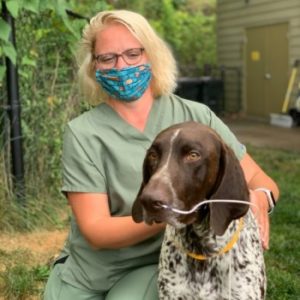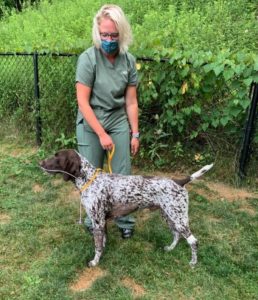This treatment story highlights Gus, a patient who presented to Avets in July 2020 for suspected heat stroke.
The hottest days of summer have arrived, and even a short time outside in these high temperatures can turn into a life-threatening emergency for pets. Heat stroke is an extremely serious condition which can lead to organ failure, seizures, and bleeding disorders – and symptoms may arise very quickly.
 Case Overview
Case OverviewGus is a 3 ½ yr old German Shorthair Pointer who presented to Avets in July for heat stroke. Gus was working in a field with his owner for about 45 minutes when he exhibited signs of overheating. His owner attempted to cool Gus down in a lake, but he collapsed on the way and was unable to walk. With some help, Gus was carried to a truck to be transported to a local feed store where he was hosed down with cool water. Gus appeared to be doing a bit better, but was still weak and unable to walk.
On the way to Avets, Gus started having liquid diarrhea and collapsed in his carrier. Upon arriving at the hospital, Avets’ Critical Care Team gave Gus large volumes of IV fluids and performed additional active cooling measures.
Gus rapidly developed Disseminated Intravascular Coagulation (DIC), which is an often fatal sequela (or result) of heat stroke where the blood vessels simultaneously clot and bleed. Based on initial bloodwork and his condition, Gus was given only a 1 in 10 chance of survival. He was treated with massive plasma transfusions to prevent hemorrhage (bleeding out). He also developed acute kidney injury, liver dysfunction, and sloughing (shedding of surface cells) of his stomach and intestines. A urinary catheter and a feeding tube were placed, and several rounds of bloodwork were monitored daily.
Despite these many serious problems, Gus made an amazing recovery. After 8 plasma transfusions, multiple days in the hospital, around the clock care from our dedicated nursing team, and daily visits from Mom and Dad, Gus began to improve. He started eating on his own, and was discharged with only mild elevations in his kidney values that have improved over the past few weeks.
Heat stroke occurs when your pet’s body temperature rises above the normal temperature range of 100 to 102.2 degrees. Pets can experience heat stroke any time of the year if they are exposed to high temperatures, however in most cases, heat stroke occurs during the summer season. Heat stroke also primarily occurs when pets are left outside in hot or warm weather without adequate shelter, access to water, or appropriate airflow.
 Animals will quickly feel the affects of heat and humidity, as they have few sweat glands to help cool them down. Panting is a pet’s main cooling mechanism. It is an obvious sign that your pet is feeling too warm and is attempting to release body heat. Any pet may experience heat stroke, however certain breeds, including brachycephalic breeds – those with short muzzles – including pugs and bulldogs, are more predisposed to overheating. Their shorter respiratory tracts are less efficient at dissipating heat. Other factors that may increase the risk of heat stroke include age, weight, and cardiac or respiratory conditions.
Animals will quickly feel the affects of heat and humidity, as they have few sweat glands to help cool them down. Panting is a pet’s main cooling mechanism. It is an obvious sign that your pet is feeling too warm and is attempting to release body heat. Any pet may experience heat stroke, however certain breeds, including brachycephalic breeds – those with short muzzles – including pugs and bulldogs, are more predisposed to overheating. Their shorter respiratory tracts are less efficient at dissipating heat. Other factors that may increase the risk of heat stroke include age, weight, and cardiac or respiratory conditions.
If your pet begins to overheat, you’ll likely notice some common signs or symptoms (including but not limited to):
Heat stroke can progress extremely quickly, and may become life-threatening. It is imperative that you act immediately if your pet shows any of these signs.
If you suspect that your pet is experiencing heat stroke, immediately remove her from the hot or warm area. Move your pet to a cool area and offer her cool (never cold) water to drink. If your pet is showing mild signs of heat stroke, such as panting and weakness, you may attempt to cool her down at home.
Take your pet’s rectal temperature and if it is above normal, use towels soaks in lukewarm water to cover her and lower her body temperature. Never use cold water, as rapid cooling can cause sudden changes in blood pressure that may worsen her condition. When your pet’s rectal temperature reaches 103.5 degrees, cease all cooling efforts immediately. Contact your family veterinarian in case your pet needs further observation and care.
If your primary care veterinarian is unavailable and your pet experiences a heat emergency, Avets is open 24/7 for emergency pet care: 412-373-4200.
Here are some tips to keep in mind that may help protect your pet from developing heat stroke: